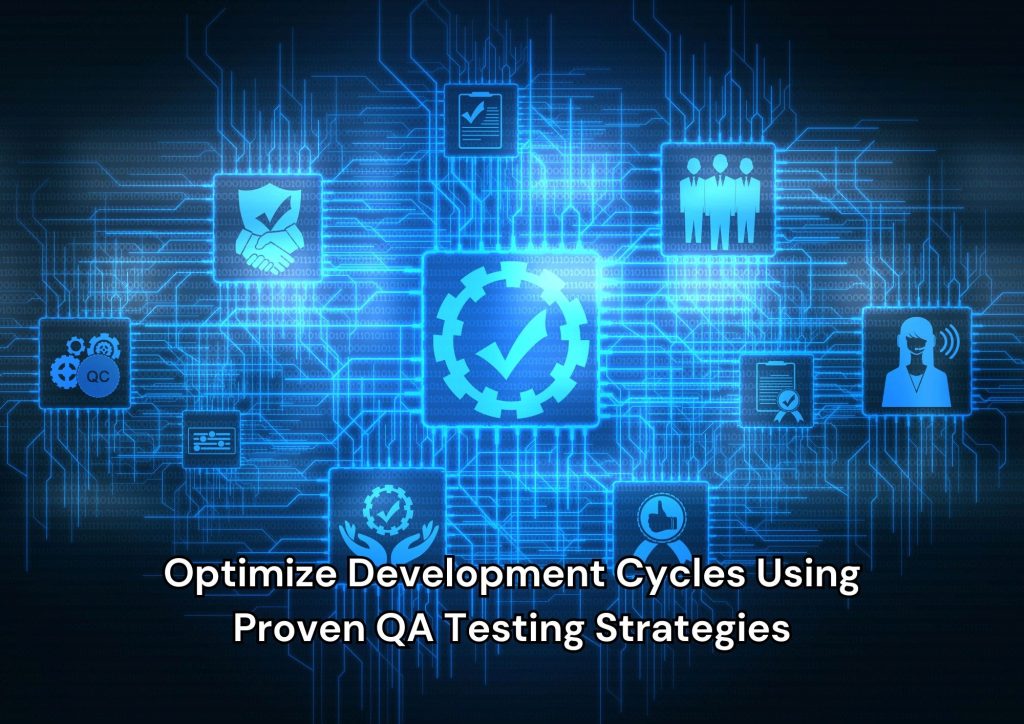In today’s fast-paced software development landscape, ensuring efficient development cycles is crucial for maintaining competitive advantage and delivering high-quality products on schedule. Organizations face mounting pressure to accelerate release timelines without compromising quality. Adequate quality assurance (QA) practices play a pivotal role in achieving this balance by detecting and addressing defects early in development. Advanced QA testing strategies reduce rework, minimize downtime, and improve software performance. A key enabler of this transformation is the Zchwantech QA testing service, which provides organizations with the sophisticated tools and methodologies necessary to optimize development cycles.
Optimizing development cycles leads to faster time-to-market, cost savings, and improved customer satisfaction. Integrating advanced QA testing methods into the software development lifecycle is essential for organizations that strive to deliver reliable, robust software products. This article outlines actionable strategies for streamlining development processes through proven QA testing practices, emphasizing how Zchwantech’s QA testing service can drive significant improvements in efficiency and quality.
Understanding the role of QA testing in development cycles
Defining QA testing in software development
Quality assurance testing is a systematic process that involves verifying and validating software applications to ensure they meet predetermined standards and requirements. Its primary objective is identifying defects, inconsistencies, and performance issues early in the development cycle. By catching problems before they reach production, QA testing helps reduce costly rework and enhances overall product quality.
Early Defect Detection and Its Benefits
One of the most significant benefits of QA testing is early defect detection. Identifying issues during the initial stages of development reduces the time and expense associated with fixes later on and ensures that the final product meets user expectations. Early detection contributes to smoother deployment cycles and helps maintain high-performance standards throughout the software lifecycle.
Impact on Reducing Rework and Improving Efficiency
Effective QA testing minimizes rework by ensuring defects are resolved before they can compound. This proactive approach leads to a more efficient development cycle, as teams can progress without needing corrective measures. Organizations can accelerate their release schedules and allocate resources more effectively by reducing the number of iterations required for bug fixes.
Key QA Testing Strategies to Optimize Development Cycles
Implementing Automated Testing
Automation is a cornerstone of modern QA testing strategies. Automated testing tools execute repetitive test cases with high precision and consistency, significantly reducing the time and effort required for manual testing. Automation not only speeds up the detection of defects but also ensures that every code change is verified through a consistent process.
Organizations can achieve continuous testing by integrating automated tests into the development pipeline. This approach allows teams to identify issues as soon as they are introduced, facilitating rapid resolution and minimizing the impact on overall development timelines. Zchwantech’s QA testing service seamlessly integrates automated testing into the CI/CD pipeline, thereby optimizing the development cycle.
Integrating Continuous Integration/Continuous Deployment (CI/CD)
Embedding QA testing within the continuous integration and continuous deployment (CI/CD) pipeline is essential for modern software development. Continuous integration enables developers to merge code changes frequently; automated testing runs on each merge to help catch defects early. Continuous deployment further accelerates the process by automating the release of tested codes into production.
This integrated approach ensures that software remains stable and reliable as it evolves. The capabilities of Zchwantech’s QA testing service support continuous integration, providing real-time feedback on code quality and performance. As a result, organizations can reduce the gap between development and deployment, leading to faster release cycles and improved overall efficiency.
Leveraging Real-Time Analytics and Monitoring
Real-time analytics and monitoring are critical for maintaining high software performance. Organizations can detect issues before they affect end users by continuously tracking key performance indicators (KPIs) such as response times, error rates, and system stability. Real-time insights allow immediate corrective actions, ensuring performance bottlenecks are resolved quickly.
Zchwantech’s QA testing service incorporates robust analytics tools that offer detailed insights into testing processes. These tools enable teams to measure the effectiveness of their QA strategies and make data-driven decisions to optimize performance. Continuous monitoring also provides a historical record of performance improvements, which can be used to refine future testing methodologies.
Conducting Comprehensive Regression Testing
Regression testing ensures that new code changes do not disrupt existing functionality. A comprehensive regression suite validates that all aspects of the software continue to perform as expected after updates or modifications. Regularly executing regression tests helps maintain software integrity and prevents the reintroduction of previously resolved issues.
An effective regression testing strategy involves automation and systematic test case management. By continuously running regression tests, organizations can quickly identify and address any inconsistencies, thereby preserving the overall quality of the application. The advanced features provided by Zchwantech’s QA testing service facilitate the automation and management of regression tests, contributing to a smoother and more efficient development cycle.
Prioritizing User Experience and Performance Testing
Ensuring an optimal user experience is a critical objective of QA testing. Performance and load testing are necessary to determine how software behaves under various conditions. These tests evaluate the software’s responsiveness, stability, and scalability by simulating real-world usage scenarios.
Performance testing identifies potential bottlenecks and areas where optimization is required, ensuring the software performs well even under heavy loads. The data gathered from these tests informs further refinements, helping organizations deliver a seamless user experience. Zchwantech’s QA testing service includes comprehensive performance and load testing tools, which are integral to achieving high-quality software that meets user expectations.
Implementation of Best Practices for QA Testing Strategies
Assessing the Current QA Processes
Before implementing advanced QA strategies, organizations must thoroughly evaluate their existing testing methodologies. This assessment should include an analysis of current performance metrics, identification of gaps, and a review of resource allocation. Establishing baseline metrics is essential for measuring the impact of new strategies and ensuring that improvements align with business objectives.
Developing a Tailored QA Testing Plan
Based on the assessment, a tailored QA testing plan should be developed to address specific organizational needs. This plan must outline clear objectives, milestones, and performance benchmarks. A comprehensive testing strategy should integrate automated testing, continuous integration, and real-time monitoring to ensure that every aspect of the software is thoroughly validated. Zchwantech’s QA testing service can be customized to align with these objectives, seamlessly integrating best practices into the development cycle.
Training and Empowering QA Teams
A well-trained QA team is critical for executing effective testing strategies. Continuous training and skill development enable support teams to remain updated on the latest tools and methodologies. Regular workshops, performance reviews, and feedback loops contribute to a culture of continuous improvement. Organizations can enhance efficiency and achieve higher-quality outcomes by empowering their QA teams.
Leveraging Continuous Improvement Processes
Continuous improvement is essential for sustaining high-quality software performance. Organizations should establish robust feedback mechanisms and iterative testing processes to refine their QA strategies over time. Teams can continuously optimize their testing procedures by analyzing real-time data and adapting to emerging challenges. The iterative process of continuous improvement ensures that the benefits of advanced QA testing are maintained, resulting in consistent enhancements in software performance.
Case Studies and Success Stories
Real-World Applications of Advanced QA Testing
Several organizations have transformed their development cycles by adopting advanced QA testing strategies. For instance, a major financial services firm implemented Zchwantech QA testing service into its CI/CD pipeline, significantly reducing post-release defects and accelerating time-to-market. Similarly, a leading e-commerce company utilized automated regression and performance testing to ensure that each release met stringent quality standards, improving customer satisfaction and higher conversion rates.
Measurable Outcomes and Return on Investment
Organizations that have integrated Zchwantech’s QA testing service report measurable improvements in key performance metrics. Metrics such as reduced defect rates, shorter release cycles, and lower operational costs illustrate the tangible benefits of advanced QA practices. The return on investment (ROI) these companies achieve validates the strategic importance of incorporating robust QA testing solutions into the development process.
Lessons Learned from Industry Leaders
Lessons learned from successful implementations emphasize the value of early defect detection, continuous integration, and real-time analytics. Industry leaders recommend a comprehensive approach that combines automated testing with ongoing training and feedback mechanisms. The best practices from these experiences serve as a roadmap for other organizations aiming to optimize their development cycles and achieve superior software performance.
Future Trends in QA Testing
Emerging Technologies in Quality Assurance
The future of QA testing is poised to be shaped by emerging technologies such as artificial intelligence, machine learning, and predictive analytics. These advancements enhance further testing processes’ speed, accuracy, and efficiency. As these technologies evolve, they will enable more precise defect detection and automated decision-making, driving continuous improvements in software quality.
The Evolution of Continuous Integration and Automated Testing
Continuous integration and automated testing are becoming standard practices in agile development environments. Integrating advanced automation tools with CI/CD pipelines will continue to evolve, reducing manual intervention and increasing overall efficiency. Organizations that adapt to these changing trends will enjoy more agile development cycles and faster releases.
Preparing for Next-Generation Software Performance Standards
As software development becomes increasingly complex, next-generation performance standards will require even higher levels of precision and reliability. Organizations must be prepared to adopt advanced QA testing strategies that incorporate real-time analytics, automated regression, and continuous improvement processes. Zchwantech’s QA testing service is well-positioned to meet these future demands, offering scalable solutions that evolve with technological advancements.
Elevate Your Software Development with Advanced QA Testing
Optimizing development cycles through advanced QA testing is essential for delivering high-quality software on schedule. Organizations can detect defects early through automation, continuous integration, real-time monitoring, and comprehensive regression testing, reduce rework, and accelerate time-to-market. The robust capabilities of Zchwantech’s QA testing service empower companies to streamline their testing processes, resulting in enhanced efficiency, reduced costs, and improved software performance.
The measurable benefits, including shorter release cycles, lower defect rates, and significant cost savings, underscore the strategic value of advanced QA testing solutions. Organizations that invest in these practices are well-equipped to navigate the complexities of modern software development and achieve lasting competitive advantage.
For more information on how to elevate software development with advanced QA testing, contact [email protected].


